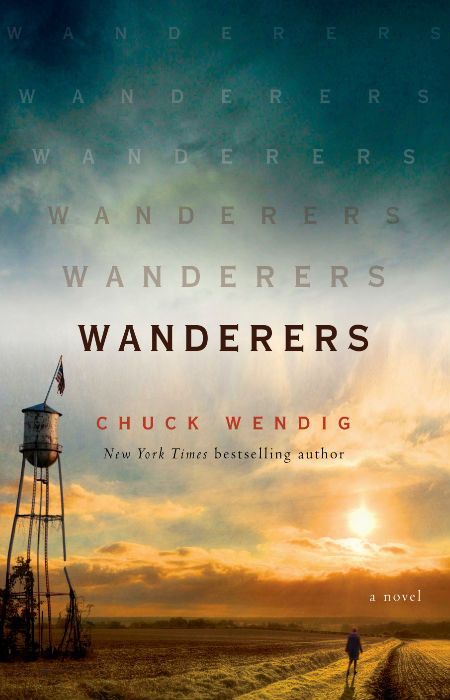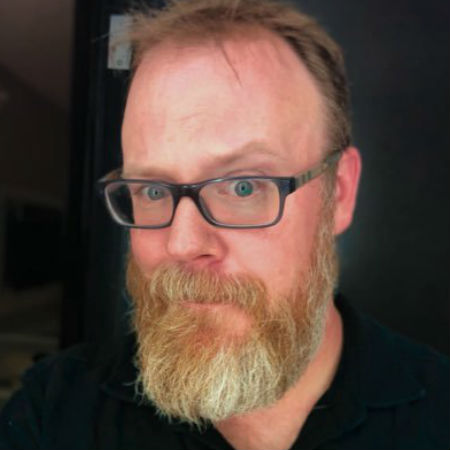
With words like “complete destruction” and “catastrophe” echoing around its definition like rabid World War Z zombies, it’s hard to see an apocalypse as anything other than an expansive, overwhelming, world-ending event.
It is, in other worlds, no small thing.
Quite how small it isn’t comes home in full force in Chuck Wendig’s masterful almost-800 pages novel Wanderers which starts small and intimate and ends up becoming, like the apocalypse against which it plays out, as bigger than Ben Hur.
For all its immense and epic storytelling, this behemoth of a story manages to retain an intimacy and small-scale emotional evocativeness that speaks to the fact that while end of the world disasters may be monumentally big, people tend to experience them on smaller, more small “d” experiential levels.
To his inestimable credit, Wendig balances beautifully between these two extremes, propelling the action along, and it is unrelenting and world-ending, by focusing on the smaller stories that together make up the greater whole.
It has been compared to Stephen King’s The Stand, due to its scope and intense character focus, and while these comparison are apt, Wanderers operates as very much its onw, non-derivative tale of humanity doing what it can to prevail against the odds.
“Sudden anger flared within her. ‘I don’t know, okay? They can’t walk forever. They’ll have to … stop, or collapse in exhaustion.’ He opened his mouth to ask another question—one of Zig’s more annoying habits was exactly that, question after question after question like he was doing a fucking BuzzFeed quiz on your behalf—but she cut him off. ‘It’s my sister out there. Okay? I need to do this. I don’t think it’ll keep going. Somehow, it’ll end soon.’ That, she said with almost zero confidence. She made that prediction only out of hope, and hope she knew had like, zero basis in reality.
‘And if it doesn’t?’
‘Then I’ll keep walking till my feet fall off.'” (P. 58)
The odds, as befits a novel of this size and stature, are considerable.
Beginning with one young woman sleepwalking out of her house, the first of a huge number of vacant-eyed people who become known as the Flock which spends much of the novel trekking across the United States to an unknown destination, Wanderers is a novel about how people react to societally-disruptive events on a micro and macro scale.
For Shana, the 17-year-old older sister of the first member of the Flock, Nessie, this weird new phenomenon, which defies the combined efforts of the CDC, Homeland Security and the military to understand or influence it in any way, is an intensely personal one.
Profoundly devoted to her sister, whom she considers to be brighter, more invested in life and more vivacious in every way possible, Shana becomes the first of the Shepherds, the friends or relatives who walk or drive along side the Flock, sworn to oversee and protect them in whatever way they can.
And, as it turns out, they need all the protecting they can get.
For when the morbid fascination and curiosity the sleepwalker phenomenon initially generates slowly begins morphing into fear, suspicion, paranoia and outright hostility, the Flock are soon in real danger, their only real allies, besides the devoted, near-omnipresent Shepherds, are doctors from the CDC such as Benji Ray and Arav Thevar, creators of predictive AI Black Swan (which may the saviour or the devil of the piece), Sadie Emeka, and after a brief but ill-conceived detour into mass hysteria, religious radio host Matthew Bird.
They are disparate group who quickly become a family of sorts, which comes with all the dysfunction and discord, as well devotion and selflessness, that term implies.

One thing they most definitely need to be is united as forces coalesce against them that variously see the Flock as angels, harbingers of the end times, agents of terrors, vectors of disease or societal collapse.
Wendig deftly and insightfully weaves in many of the trenchant maladies of our age – to be fair, many of them have dogged us since we first developed sentience but they are more noticeable and virulent in an age where truth has become relative and lies spread like digital wildfire – such as “fake news”, right-wing conspiracies, racism, extreme nationalism, and paranoia about what lurks in the shadows, letting them, effectively, hang themselves by their own rope.
There is no overt moralising or sermonising in Wanderers which means that it is never heavyhanded or overdone, even as it exposes all of society’s tumours and skeletons to the withering light of day, making it abundantly clear how little any of them contribute to the betterment of the species, especially when its very survival is on the line.
Wendig also rather cleverly lets the story build in believable increments.
There is, as you might expect, a big, bruising final act but this masterfully-spun novel never once abandons its quiet, unyielding, steady narrative climb in pursuit of some big, bang moment; it also never eschews its grim attachment to the hard-edged corners of real life which promises some happy endings but never easy, neat resolutions and never in the nick of time.
For instance, Black Swan, the AI program which has proven a dab hand at predicting disasters aplenty is never the go-to solution for anything; it’s powerful yes, but Wendig positions it with much more nuance and subtlety, with its eventual role in the big scheme of things far more layered than you might initially suspect.
“MORNING IN NOWHERE, NEBRASKA.
Thick bands of phlegmy clouds obscured the sun—even at noon, everything seemed gilded in an eerie dark light, like you might find at twilight or during a solar eclipse. Ill-shaped shadows floated across the wheat fields.
It only served to highlight the weirdness that Marcy was experiencing.
The flock was upset.
Not the shepherds. No, the shepherds didn’t know squat because the flock didn’t show any kind of displeasure or concern. They did as they did, marching forward, eyes as empty as bathtub drains.
Just the same, they were upset.
She could feel it. She could hear it.” (P. 415)
In other words, Wendig keeps the story, no matter how fantastical its premise might feel at times, grounded and rooted in real, in the trenches humanity where the very best of the angels of our nature are as apt to show themselves as the very worst.
Consequently, while the story is big, real big, with a host of beautifully conjured characters, all of whom feel vibrantly and fulsomely expressed, no matter how loathsome of them may be, and machinations that rock civilisation to its core, it remains intimate and so true to life and to some worrying trends in society that it feels like something that could, rather frighteningly, happen to us right here, right now.
What elevates Wanderers, apart from its superbly well-judged writing, memorable characters and keenly-judged narrative focus and pacing, is the way it keeps this focus on humanity right throughout its wholly engrossing length.
It means that a concept that might feel like emotionally remote, popcorn-eating blockbuster fodder, instead feels very real, very dark and very hopeful all at once, which neatly captures, when you stop it to think about it, everything that makes us human, apocalypse or not.
We are, after all, resolutely human at the very best and very worst of times, and Wendig captures that contradictory humanity in all its life-affirming, self-destructive glory, giving us in the process one of those classically epic stories that will stand the test of time.
However long that is, of course.